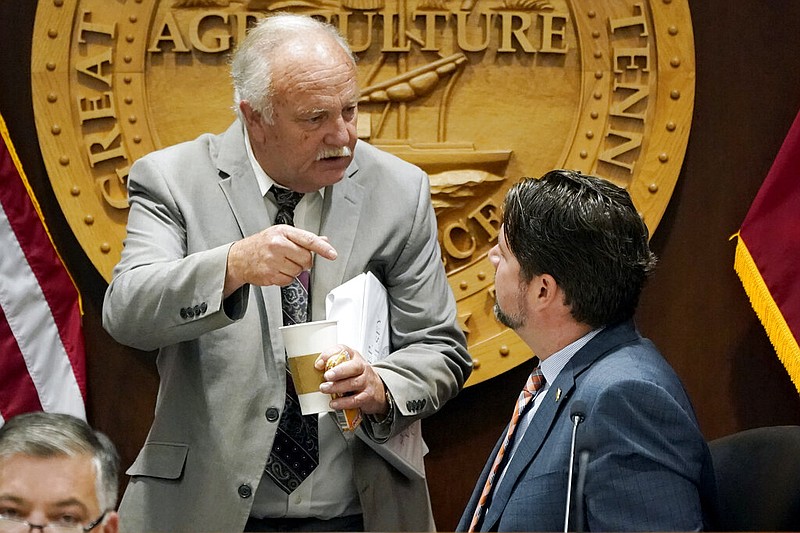NASHVILLE - Ford Motor Co., Volkswagen and General Motors are all voicing concerns about efforts in the Tennessee General Assembly that seek to block or weaken COVID-19 precautions the auto manufacturers have taken.
"We have heard from a number of businesses, including Ford and groups regarding proposals and we have told them to reach out directly to legislators with their concerns," Lee's communications director, Laine Arnold, said in a text.
Arnold said the list includes Volkswagen, which has an auto assembly plant in Chattanooga, as well as General Motors, which has a plant in Spring Hill.
It was not immediately clear whether Nissan, located in Smyrna, has directly contacted the governor's office.
The concerns are being voiced as legislators have convened to push back against mask mandates and vaccine requirements that have been put in place to fight a pandemic that has killed more than 16,000 Tennesseans.
Lawmakers are poised to give approval to a COVID-19 bill with multiple provisions attacking vaccination and mask restrictions as well as others imposed by local officials and the federal government.
Earlier Friday, the GOP-led Senate passed its version along partisan lines. The House, also firmly controlled by Republicans, was still considering the matter Friday evening.
"The issue that is still remaining is whether or not to do a prohibition against a mask mandate in private business and whether or not to have a mask mandate prohibition for private businesses and the exemptions for federal funds and contracts and everything else," House Majority Leader William Lamberth, R-Portland, told the Times Free Press in an interview outside the House chamber.
Lamberth said the House bill has some accommodations for that, but the Senate version does not.
In a text to several lawmakers, Ford's regional director of governmental affairs, Gabby Bruno, voiced worries to several legislators about the COVID-19 omnibus bill's provisions impacting businesses, raising concerns about blocking the private sector's mask requirements.
"We are very concerned, however, with the current legislative proposal that would prohibit companies from requiring masks," she wrote in a text shown to the Times Free Press. "Wearing masks is what's kept our facilities running through this."
She added: "Can you share the legislators' perspective on it?"
In September, Ford representatives joined Lee, a Republican, to announce that Ford was coming to Stanton in rural West Tennessee to build a $5.6 billion electric truck and battery complex, generating an estimated 5,700 to 5,800 jobs, plus thousands anticipated with other suppliers expected to locate there.
Lawmakers approved a nearly $900 million package, including $500 million to help offset Ford's costs in construction. Volkswagen is already in the electric vehicle business and producing a new SUV in Chattanooga.
Earlier in session
Early Thursday evening, Senate Majority Leader Jack Johnson had presented the legislation to block or deter COVID-19 mandates.
"This bill, I believe, creates a responsible framework to move forward and hopefully and responsibly get our lives back," Johnson told State and Local Government Committee members. "This bill will create some clarity."
Sen. Raumesh Akbari, a Memphis Democrat and attorney, responded that she found the intervention into the affairs of private business troubling.
"Is this a slippery slope?" she said. "Where will we stop next?"
State Labor and Workforce Development Commissioner Jeff McCord cautioned lawmakers that if the bill becomes law it risks drawing in the federal government to take over the responsibilities of his department's Tennessee Occupational Safety and Health Administration.
"It will still start a process and that's up to OSHA, but it'll start a process where they can send us a letter and start proceedings to investigate our state plan. That's the concern," McCord said in a later interview outside the committee room. "We need to make sure to express that caution, that concern to [legislators] as part of this."
McCord also noted the U.S. Occupational Safety and Health Administration's fines are higher than the state's.
Both House and Senate versions also restrict mask mandates in schools and businesses.
Business pushback
The state's business community has jumped into the issue over the pushback on COVID-19 mandates, urging lawmakers not to interfere with their operations.
Some 30 entities, including the Tennessee Chamber of Commerce and Chattanooga Area Chamber, as well as businesses and health care groups signed a letter requesting lawmakers back off.
So did the Tennessee chapter of the National Federation of Independent Business, which also noted it was putting the issue on its annual evaluation of where legislators stand on business issues.
"Tennessee has a significant number of businesses designated as federal contractors and such businesses must work diligently to follow executive orders and/or applicable OSHA guidelines or risk substantial damage to their businesses," the letter said. "In addition, some businesses have made the decision that their workforce requires vaccination because of special risks to their employees or the customers that they serve. Overall, our businesses are working to comply with the federal requirements until such time that the requirements are withdrawn, overturned or repealed.
"We must express our opposition to any proposed legislation that may conflict with these federal requirements and overly complicate or conflict with employer operations during the pandemic. We oppose any proposals that outright remove the ability of an employer to determine their own vaccination and mask policies. We believe that any legislation of this kind is unnecessary government intrusion into the operation of our businesses."
Among businesses that would be impacted is Chattanooga-based BlueCross BlueShield of Tennesee, which drew the wrath of a number of Republicans after the health insurer fired 19 workers in public-facing positions who refused to get vaccinated. That was out of some 900 workers impacted.
Contact Andy Sher at asher@timesfreepress.com or 615-255-0550. Follow him on Twitter @AndySher1.
